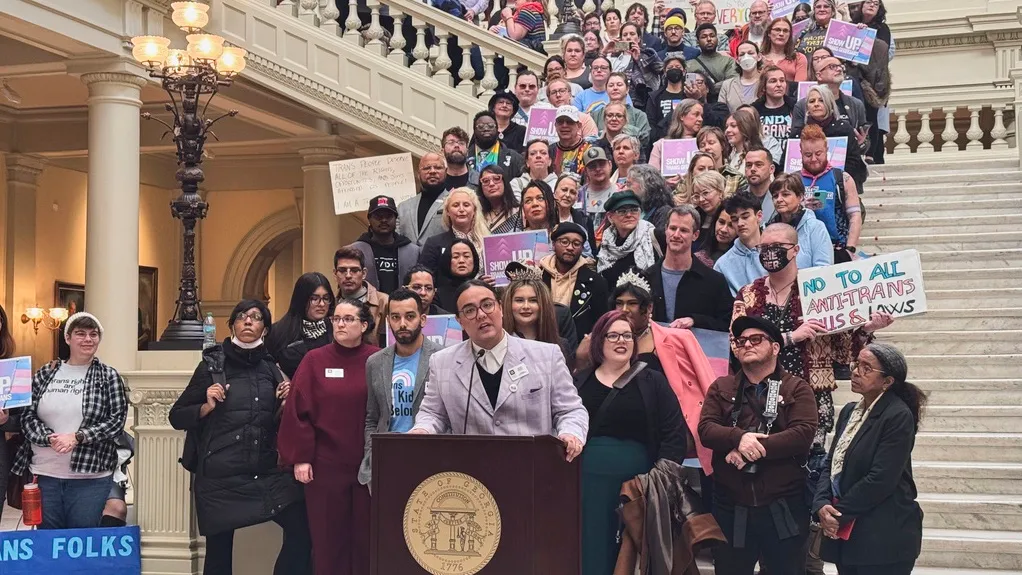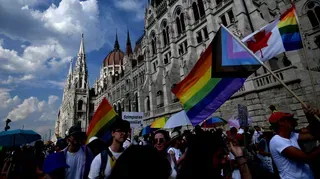April 18, 2015
CIA Battles Misconceptions To Keep Nation Safe
Kilian Melloy READ TIME: 3 MIN.
It was a recruitment fair at Georgetown University when Charles first considered working for the Central Intelligence Agency. The National Clandestine Service gave its presentation, Charles recalled, and it just didn't seem like the life for him. The seed, nevertheless, was planted.
"Jumping out of helicopters and ripping out walls did not appeal to me," said Charles, 36, a gay man who works as a senior analyst in the Directorate of Intelligence.
Charles eventually warmed to the idea of working in America's intelligence community, finding his place in the Directorate of Intelligence where his daily task is determining if he has a story that reaches Presidential threshold.
"And if you do, you will be writing a PDB that day," he explains.
A PDB is a President's Daily Brief, typically a one or two page document that is run up the chain of command to the very top.
"That's a big deal," Charles said during a recent interview with SFGN in Miami Beach, disclosing he had written a PBD before. "That's something that gets written up and coordinated across the entire intelligence community."
Of the 17 U.S. intelligence agencies, the CIA, Charles says is leading the way in terms of accepting LGBT people. However, the agency does deal with misconceptions.
Dan, 28, is on the front lines of the CIA's battle against misconceptions. A new transfer from the Department of Defense, Dan is aware of public perception regarding some of the CIA's foreign missions. He said because the agency works with top-secret information, public awareness of CIA's "good work" is not always published.
"We see a lot of things that are not accurate," Dan said. "The agency can make an easy target for inaccurate information and painting misconceptions. When everything you do is classified, it's kind of hard to share those good stories or those wins, even if one of those good stories counters some misinformation that is out there."
When pressed on this issue, Dan, a cyber-security officer in the Directorate of Science and Technology, said, "we can't declassify something just because it will make us look good in the face of some misinformation."
Recently, the CIA came under heavy scrutiny for its former detention and interrogation program. In a report released in December of 2014, CIA Director John O. Brennan acknowledged "that the detention and interrogation program had shortcomings and that the Agency made mistakes."
Brennan, a 25-year veteran of the CIA, further stated "the most serious problems occurred early on and stemmed from the fact that the Agency was unprepared and lacked the core competencies required to carry out an unprecedented, worldwide program of detaining and interrogating suspected al-Qaeda and affiliated terrorists."
Such admissions of wrongdoing created a firestorm in the media and fed into the narrative of the CIA's shadowy work. Keeping the nation safe and secure will always be the CIA's number one mission, Dan said, but how the nation discovers this is the tricky part.
"It's a shame that some of the wins can't be discussed more openly because it would paint a much different picture."
Established in 1947, the CIA came into being through the National Security Act, signed by President Harry Truman. This act charged the CIA with coordinating the nation's intelligence activities and correlating, evaluating and disseminating intelligence affecting national security.
For the gay officers interviewed by SFGN, being able to express their true authentic selves at work goes to the core of the agency's standards.
"Your integrity is everything you do," Dan said. "Through actions and not just words. It's a great environment. I was almost a little bit floored when I walked in the door."
In reaching out to SFGN for this series, CIA officers want the public to know that LGBT people can feel comfortable and are welcome at the agency. Being a part of ANGLE, an employee resource group for the LGBT community, helps officers interact with friendly and likeminded colleagues.
"Through ANGLE, I got more and more comfortable about myself," said Charles, who began his CIA career as a closeted gay man.
Both Charles and Dan said they are currently single men who have recently separated from their partners. SFGN asked if it were possible to have a serious relationship and even marriage at the agency.
"Dating scene is different," Dan said. "I don't want to go around and announce I work for the agency even though I'm an overt employee, but it's doable."
Next week, in part three of our four part series on LGBT life at the CIA, we chat with women and their role at ANGLE.govenr
Kilian Melloy serves as EDGE Media Network's Associate Arts Editor and Staff Contributor. His professional memberships include the National Lesbian & Gay Journalists Association, the Boston Online Film Critics Association, The Gay and Lesbian Entertainment Critics Association, and the Boston Theater Critics Association's Elliot Norton Awards Committee.

 Copyright South Florida Gay News. For more articles, visit
Copyright South Florida Gay News. For more articles, visit 



